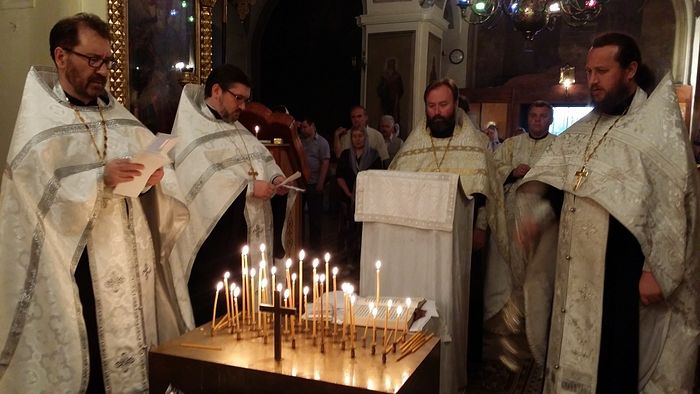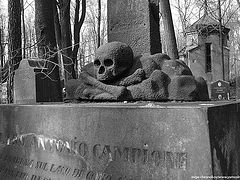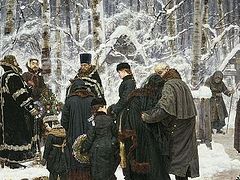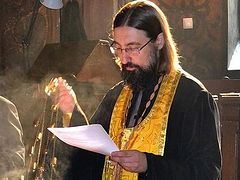In the name of the Father, the Son, and the Holy Spirit!
For he is not a God of the dead, but of the living: for all live unto him (Lk. 20:38), said Christ the Savior to the Sadducees, who did not believe in the resurrection of the dead.
Beloved in Christ brothers and sisters! The Holy Orthodox Christian Church, firmly believing in these true words of the Savior, always preaches this undeniable truth for all to hear—that a person’s life does not end at death. What do we see dying? Only the body, which is taken from the earth and again returns to earth. The flesh decomposes and turns to dust, while the person himself, with all of his senses and his whole immortal soul, continues to live, only crossing from this world into the next world beyond the grave. It would follow that our association between the living and the dead is not disrupted by death but continues to exist.
Based on this truth, the Church always, beginning with Old Testament times and especially in New Testament times, Apostolic times, has performed and continues to perform commemorations and prays for our reposed brothers in the faith. In offering daily prayers for its reposed children, the Holy Church encourages all the faithful do this, so that they would with one voice and one heart offer fervent prayers to the Throne of God, asking that He give rest in blessed places to the souls of our relatives who have fallen asleep. We are moved to prayer for the reposed by our Christian love, which unites all in Jesus Christ in one brotherhood. Those reposed in our faith are our neighbors, whom God commands us to love as we love ourselves. For God did not say, “Love your neighbors while they live on earth. It would follow that the Lord does not limit love of neighbor to this earthly existence, but extends it also to the eternal world beyond the grave. But how if not by commemoration, if not by prayer can we prove our love for those who have passed over into life beyond the grave? Each of us desires that our close ones would not forget us and would pray for us after our departure. So that this would come to pass, we ourselves must commemorate the dead. With what measure ye mete, it shall be measured to you again (Mt. 7:2) says the Savior. Therefore those who commemorate the dead the Lord will commemorate, and people who have departed this world will also remember them. Great is the consolation and reward for someone who saves his neighbor from temporary misfortune, but much greater is the reward and consolation awaiting someone who through his prayers helps his reposed neighbor to receive forgiveness of sins and pass from the dark dungeons of hell into the bright and blessed habitations.
Do the reposed need our prayers? Yes, they do, because prayer brings great benefit to them. The fact of the matter is that after death there are two eternities: either the eternal blessedness of the righteous, or the eternal torments of sinners. We also know that there is no man who has lived on earth who has never sinned. Therefore it is also decidedly true that we are born in sins, that we live our lives in sins, and in sins do we finish our earthly existence. But do all who have sinned offer complete and sincere repentance before death? After all, death can overtake a person in a state of serious illness, when he’s lost his memory and his emotional powers are completely exhausted. It’s obvious that a person in such a state cannot remember his deeds and repent of them—and so he dies in his sins. Death often strikes unexpectedly, and if the person has not repented at all, he will also depart with his sins. Then he can no longer help himself by any means. A person can only change his lot while he is alive, by doing good works and praying for his salvation to the Lord. So, in such cases prayer for the dead is very necessary and brings them great benefit.
Many of our close ones have long since left the earth, but our loving hearts cannot forget them, long for them, perhaps even more than for the living. In like manner the reposed also look in our direction from the other world, burning with love for those here who were especially close to their hearts. If one of these dead has attained justification before God, then answering our love with mutual love he sends down heavenly help to us; but those who have not attained justification can receive great help from our prayers to ease their lot beyond the grave. The time will come when we will see them. How joyful it will be to hear those words of gratitude for our prayers! They will say, “You remembered me, you did not forget me, and helped me in my time of need. I thank you.” And on the contrary, how bitter it will be to hear the reproach for those who did not pray for the dead! “You did not remember me, you did not pray for me, you didn’t help me in my time of need, and I reproach you for this.”
The state of the reposed is like that of a man swimming along a very dangerous river. Prayer for the reposed is like saving rope that a person throws to his drowning neighbor. If somehow the gates of eternity would be opened before us and we could see these hundreds and thousands of millions of people striving painfully for a peaceful harbor, what heart would not be stricken and overwhelmed at the sight of those people of one faith and family, wordlessly calling for our prayerful help!
Just how needed prayer is for the reposed, how there really does exist a connection with the world beyond the grave can be seen from the amazing but true story I will now tell you from the life of one of the parishes of our Russian Church. In the village of Lysogorka, the priest died. Another priest was sent to replace him—a young priest, who unexpectedly died at his first service there, right in the altar. Yet another priest was sent, but the same thing happened to him—on the first day of his service there, after they sang the Our Father and the verse before Communion, the priest did not come out of the altar with the Holy Gifts for a long time, and when the church warden went into the altar he saw the priest lying dead in full vestments at the Holy Throne. All were horrified when they learned of this mysterious death, and not knowing its cause, said that some onerous sin must burdening this parish if the victims of it are two young and completely innocent lives. Rumors about this spread throughout the region, and no other priests could be persuaded to come and serve at that parish.
Only one elder-monk agreed. “I am going to die anyway. I’ll go and serve the first and last Liturgy—no one will be orphaned by my death.”
During the service, when they were finishing the singing of the Our Father, the survival instinct nevertheless demanded its rights, and the elder asked that both the side doors and the Royal Doors be opened. During the verse before Communion he saw at behind the Holy Throne some sort of silhouette. This silhouette waxed more and more sharply, and then suddenly beyond the Throne the dark image of a priest dressed in vestments could be seen, bound hand at foot with chains.
Shivering with fear, the monk mixed up the words of the prayer. But after a little while he regained his composure, strengthened himself in spirit and went out to commune the faithful. It was clear to all that something strange had happened to him.
But the phantom continued standing there, rattling his chains and with fettered hands pointed to a case on the altar.
At the end of the Liturgy the hieromonk called in the warden and they opened the case, in which there turned out to be… commemoration lists. What happened is that the reposed priest had been given commemoration lists and he had set them aside for another time without reading them. Now the elder understood the reason for the vision and began serving daily Pannikhidas [services for the dead] and reading the accumulated lists of names.
On the next Sunday he served a Liturgy for the reposed for the soul of the dead priest. When they sang the verse before Communion, the silhouette of the dead priest appeared once more. But this time he was no longer tragic and terrible as he was the first time, but with a bright and happy face and no chains on his hands and feet. After the serving elder-hieromonk received Holy Communion the phantom moved, bowed to the ground before him and disappeared.
We can see by this example how prayers for the reposed bring them benefit and relieve their lot. And it is no coincidence that we are talking about this today. It is because today the Holy Church marks a special day called Meat-fare Ancestor Saturday, and gathers the Orthodox for common prayer before the Throne of God for our brothers in the faith who have departed to eternal life. And tomorrow the Holy Church remembers the terrible Second Coming of the Lord and the end of the world.
Rousing its members to be prepared for the Last Judgment, the Holy Church asks us to pray to the Righteous Judge for our reposed relatives, that they may be forgiven all their sins, and may the path from the dark underworld be cleared for them to the bright habitations of the Heavenly Father.
Dear brothers and sisters, let us offer up prayers to Christ God, and cry out with our whole hearts: With the saints give rest, O Christ to the souls of Thy servants, where there is neither sickness nor sorrow, nor sighing, but life everlasting. Amen.





